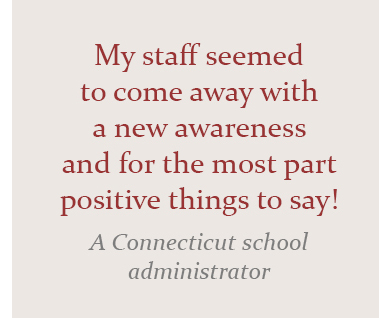|
right response CT
CT just start—unequal treatment of youth
school police collaboration
school police training
using youth behavior data
understanding disciplinary data
CT juvenile justice
CT funding opportunities
links |
 Concerned about rising rates of suspension and disproportionate discipline of minority students? Concerned about rising rates of suspension and disproportionate discipline of minority students?
Seeking the most appropriate and effective responses to student misbehavior?
Interested in improving relationships with police?
Effective School Staff Interactions with Students and Police is a curriculum developed by the Juvenile Justice Advisory Committee (JJAC) and its School/Police Task Group focused on best practices to expand the use of positive school discipline and alternatives to the juvenile justice system, ensure a consistent response to student misbehavior, and reduce disparate school disciplinary treatment of students based on race/ethnicity.
In the training, participants learn:
- The value of building positive relationships with students.
- Strategies for interacting more effectively with distressed students.
- The role of law enforcement in schools.
- How the juvenile justice system works.
- About disproportionate minority contact (DMC) with the school disciplinary and juvenile justice systems.
- Best practices for creating partnerships between schools and police to reduce suspensions and arrests.
- Be aware of community resources to support youth and families.
A formal evaluation of the training program’s effectiveness has been completed by the University of Connecticut Center for Applied Research in Human Development. Results show positive, sustained increases in participants’ knowledge 5–7 months after training completion. To view the full evaluation report, use the link below.
Acrobat Reader is required to view the following document. If you cannot view it, please contact our office.
Visit the Training & Events page for dates of upcoming training sessions and registration information. |